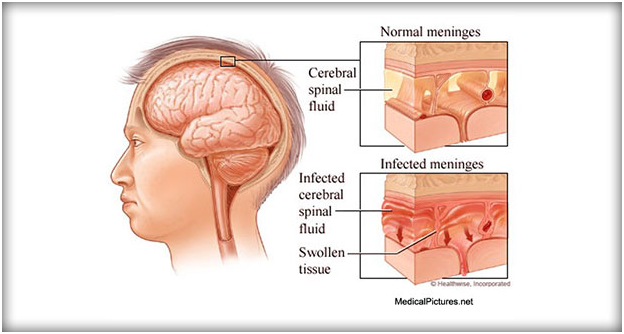
Definition: –
Encephalitis is defined as inflammation of the brain. This definition means encephalitis is different from meningitis, which is defined as inflammation of the layers of tissue.
Causes: –
Encephalitis is most often caused by a viral infection. Many types of viruses may cause it. Exposure to viruses can occur through:
• Breathing in respiratory droplets from an infected person
• Contaminated food or drink
• Mosquito, tick, and other insect bites
• Skin contact
Routine vaccination has greatly reduced encephalitis due to some viruses, including:
• Measles
• Mumps
• Polio
• Rabies
• Rubella
• Varicella (chickenpox)
Symptoms: –
Some people may have symptoms of a cold or stomach infection before encephalitis symptoms begin.
When this infection is not very severe, the symptoms may be similar to those of other illnesses:
• Fever that is not very high
• Mild headache
• Low energy and a poor appetite
Other symptoms include:
• Clumsiness, unsteady gait
• Confusion, disorientation
• Drowsiness
• Irritability or poor temper control
• Light sensitivity
• Stiff neck and back (sometimes)
• Vomiting
Investigations: –
• Brain MRI
• CT scan of the head
• Culture of cerebrospinal fluid (CSF), blood, or urine (however, this test is rarely useful)
• Electroencephalogram (EEG)
• Lumbar puncture and CSF examination
• Tests that detect antibodies to a virus (serology tests)
• Test that detects tiny amounts of virus DNA (polymerase chain reaction — PCR)
Treatment: –
The goals of treatment are to provide supportive care to help the body fight the infection, and to relieve symptoms.
Medications
• Antiviral medicines, if a virus caused the infection
• Antibiotics, if bacteria is the cause
• Anticonvulsive medicines to prevent seizures
• Steroids to reduce brain swelling
• Sedatives for touchiness or restlessness
Prevention: –
Children and adults should avoid contact with anyone who has encephalitis.
scheming mosquitoes may reduce the chance of some infections that can lead to encephalitis.
• Apply an insect repellant contain the chemical, DEET when you go outside (but do not use DEET products on infants younger than 2 months).
• take away any sources of standing water (such as old tires, cans, gutters, and wading pools).
• Wear long-sleeved shirts and pants when outside, particularly at dusk.







